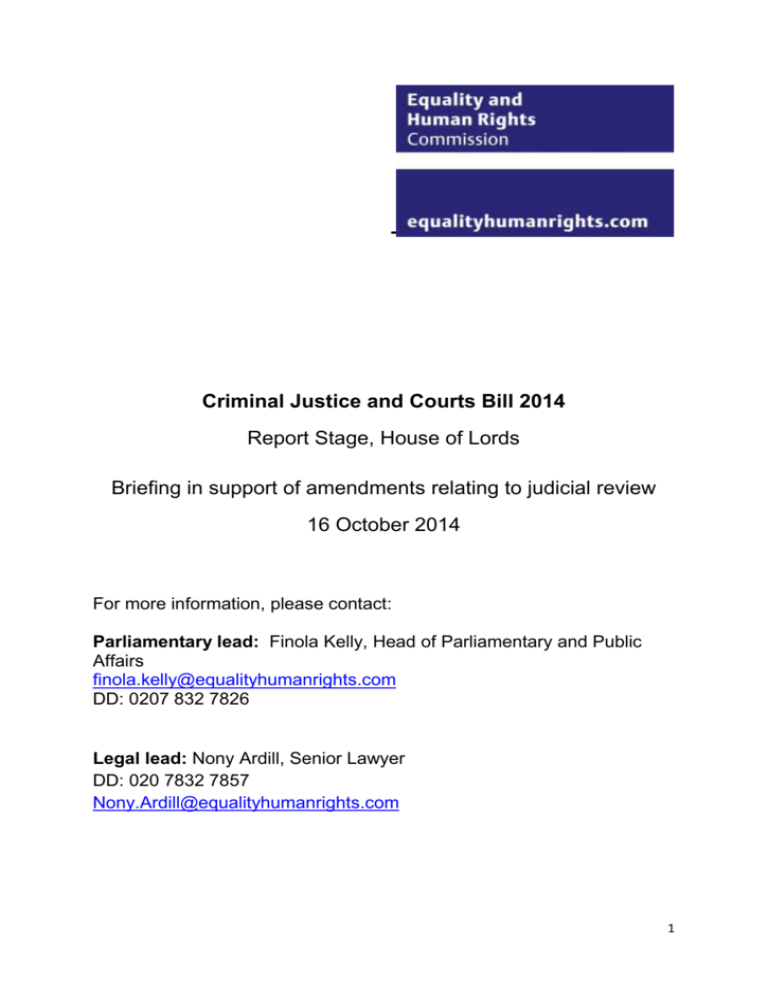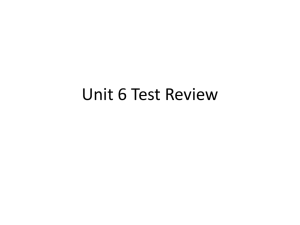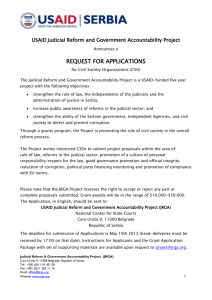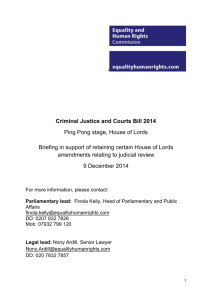Briefing in support of amendments relating to judicial review
advertisement

- Criminal Justice and Courts Bill 2014 Report Stage, House of Lords Briefing in support of amendments relating to judicial review 16 October 2014 For more information, please contact: Parliamentary lead: Finola Kelly, Head of Parliamentary and Public Affairs finola.kelly@equalityhumanrights.com DD: 0207 832 7826 Legal lead: Nony Ardill, Senior Lawyer DD: 020 7832 7857 Nony.Ardill@equalityhumanrights.com 1 1. Introduction This briefing supports amendments to provisions in the Criminal Justice and Courts Bill on judicial review (amendments to Clauses 70, 73, 74, 75 and two proposed new clauses after Clause 78). As the regulator of the public sector equality duty (PSED) and a National Human Rights Institution, the Commission is concerned that judicial review should remain an effective mechanism for access to justice. It is particularly important that it is available to ensure public authorities’ compliance with the PSED and the Human Rights Act 1998, and that the courts do not lose the potential benefits of third party interventions in such cases. Clause 70 - Commission’s recommendation Support Amendments 146 to 154 Explanation Clause 70 of the Bill would amend Section 31 of the Senior Courts Act 1981 by requiring the High Court or Upper Tribunal to refuse permission for judicial review, or withhold a remedy, if they considered it ‘highly likely that the outcome for the applicant would not have been substantially different’ had the conduct of the public body concerned not occurred. Currently, the courts apply a test of 'inevitability'. This amendment would retain the discretion of the High Court to grant a remedy, even if the court thinks it highly likely that the outcome for the applicant would have been substantially the same, had the public body's conduct not occurred. The amendment would also give discretion to the High Court or Upper Tribunal, when dealing with an application for leave, to consider whether the outcome for the applicant would have been different had the conduct not occurred. The effect of the amendment would be that, if the court or tribunal decided to take this factor into account, it may (rather than ‘must’) refuse leave, and only if appeared to be inevitable (rather than ‘highly likely’) that the outcome would not have been substantially different. Our analysis In its submission to the recent Joint Committee on Human Rights (JCHR) inquiry into the proposed judicial review reforms,1 the Commission’s assessment was that the Ministry of Justice proposals would have a substantial adverse impact on the ability of individuals and 1 Submission of the Equality and Human Rights Commission to the JCHR Inquiry into the implication for access to justice of the Government’s proposed judicial review reforms, November 2013 2 organisations to hold the state to account, including in relation to breaches of the European Convention on Human Rights (‘the Convention’). Our submission also made clear that judicial review is not a system of appeal, but a process by which the High Court scrutinises the lawfulness of decisions made by public bodies. It is in the public interest to ensure that administrative decisions are taken lawfully. Remedies in judicial review are always discretionary: for example, the court can declare a decision to be unlawful but refuse to quash it. The lawfulness of decision-making by public bodies is particularly relevant to enforcement of the public sector equality duty (PSED), which requires public authorities to have due regard when carrying out their functions to the need to eliminate discrimination, advance equality of opportunity and foster good relations.2 It is a duty to consider, rather than a duty to achieve any particular outcome. In the case of Bracking,3 the Court of Appeal confirmed the central role of the PSED within policy formulation and emphasised that failing to comply with it would make a decision unlawful: ‘It seems to me that if a decision is reached without due regard to the PSED then it is an unlawful decision and, subject to any overarching discretionary features, the decision should be quashed.’ (per Lord Justice McCoombe, para 69) Unless Clause 70 is amended, the courts may find themselves obliged to reject many judicial review applications which are based on noncompliance with the PSED. This would undermine the enforceability of the duty and its effectiveness ‘as an integral and important part of the mechanisms for ensuring the fulfilment of the aims of anti-discrimination legislation’.4 The Commission also shares two other concerns raised by the JCHR: The lowering of the threshold from 'inevitable' to ‘highly likely’ may give rise to breaches of the right of access to court under Article 6(1) of the Convention.5 The lower threshold risks turning the permission stage of judicial review proceedings into a full dress rehearsal of the substantive 2 Section 149 of the Equality Act 2010 Stuart Bracking and others v Secretary of State for Work and Pensions [2013] EWCA Civ 1345 4 Stuart Bracking and others v Secretary of State for Work and Pensions [2013] EWCA Civ 1345, para 26 5 Joint Committee on Human Rights; The implications for access to justice of the Government’s proposals to reform judicial review; Thirteenth Report of Session 2013-14. Para 44 3 3 claim, as parties will need to argue whether the procedural flaw would make any substantive difference to the outcome.6 Lord Pannick’s amendments to Clause 70: 146 147 148 149 150 151 152 153 154 Page 67, line 30, leave out “must” and insert “may” Page 67, line 32, leave out “not” and insert “decline to” Page 67, line 34, leave out “highly likely” and insert “inevitable” Page 68, line 4, leave out “must” and insert “may” Page 68, line 6, leave out “highly likely” and insert “inevitable” Page 68, line 7, leave out “must” and insert “may” Page 68, line 27, leave out “must” and insert “may” Page 68, line 32, leave out “highly likely” and insert “inevitable” Page 68, line 34, leave out “must” and insert “may” Clause 73 - Commission’s recommendation Support Amendment 164 Explanation Clause 73 of the Bill establishes a presumption that interveners in a judicial review would, unless there are exceptional circumstances, pay any costs incurred by another party as a result of the intervention,. This amendment would reverse this presumption, meaning that interveners would only have to pay the costs of another party in exceptional circumstances, by reference to criteria set out in the rules of the court. It also gives the court discretion to order another party to the proceedings to pay an intervener’s costs. Our analysis Clause 73 would have a deterrent effect on prospective interveners. The potential value of interventions in assisting the court has been acknowledged by the Rt Hon the Baroness Hale, Deputy President of the Supreme Court.7 The parties to a judicial review may not have the resources, perspective or expertise to provide all the information relevant to determining the issues, especially where the impact of the judgment could extend beyond the facts of the case. 6 Ibid para 46. This concern has also been raised by the Constitution Committee in its report on the Criminal Justice and Courts Bill, 2nd July 2014 7 Speech to conference: Judicial review trends and forecasts conference. London 14 October 2013. 4 The Commission has given assistance to the court through many of its own interventions. In our first six years of operation (to November 2013), we intervened in 27 cases in the High Court. Our interventions in all the 22 concluded cases added value, and in 14 of these cases our intervention had a particularly substantial influence on the proceedings. This included cases where, in our assessment, the judgment adopted or reflected our submissions or our intervention helped to encourage a settlement. The following examples illustrate how the Commission’s interventions have had an impact on the outcome of judicial reviews: In the case of Bracking,8 the Commission’s submissions drew attention to Article 19 of the UN Convention on the Rights of Persons with Disabilities (the requirement on a State to promote independent living). The court held that the Secretary of State should have been made aware of Article 19 in considering the scope of the PSED in relation to disabled people. Our submissions on the ‘due regard’ duty under the PSED were also accepted by the court. In Detention Action v Secretary of State for the Home Department 9, a judicial review concerning the detained fast track for asylum seekers, the NGO claimant accepted that it did not have ‘victim’ status under the Human Rights Act 1998, and so could not rely on alleged violations of the human rights of others. Through our intervention, we were able to advance arguments relating to potential breaches of Article 5 of the Convention (right to liberty), which had a demonstrable impact on the outcome of proceedings. In R (B) v Director of Public Prosecutions,10 the Commission made submissions on the obligations on the Crown Prosecution Service (CPS) under the former Disability Equality Duty. These submissions were accepted by the court and led to the CPS issuing new guidance on dealing with vulnerable witnesses and defendants in the criminal justice system. As drafted, Clause 73 would appear to risk costs being awarded even against interveners whose submissions make a significant contribution to the outcome of the case. The Commission also shares the concern expressed by the JCHR about the false distinction made in Clause 73 between interveners who apply for permission to intervene and those 8 Stuart Bracking and others v Secretary of State for Work and Pensions [2013] EWCA Civ 1345 Detention Action v Secretary of State for the Home Department [2014] EWHC 2245 (Admin) 10 R (B) v Director of Public Prosecutions [2009] EWHC 106 (Admin) 9 5 who are invited to do so. The latter would not face the same presumption on costs. Lord Pannick’s amendment to Clause 73 164 Page 70, line 21, leave out subsections (2) to (6) and insert— “( ) The High Court and the Court of Appeal shall have a discretion whether to order an intervener to pay the costs of a relevant party to the proceedings, and shall have a discretion whether to order a relevant party to the proceedings to pay the intervener’s costs.” Clause 74 - Commission’s recommendation Support Amendments 166 to 168 Explanation Clause 74 of the Bill would impose restrictions on the ability of the High Court and the Court of Appeal to award costs-capping orders (otherwise known as protective costs orders) in judicial review cases which are in the public interest. In particular, Clause 74(3) provides that a costscapping order can only be made once the court has already granted permission to apply for judicial review. The amendment would remove this restriction, so allowing the court to continue granting costs-capping orders in cases where permission has not yet been granted. The amendment would also delete Clauses 74(4) and 74(5), which permit court rules to specify information that an application for a costs-capping order must contain. In addition, the amendment would delete Clause 74(6)(c) which allows the court to make a costs-capping order only if, without one, the applicant for judicial review would withdraw and it would be reasonable for them to do so. Finally, the amendment would delete Clause 74(9) to 74(11); these are regulation-making powers which would allow the Lord Chancellor to amend the criteria that the court must take into account when considering whether a judicial review is in the public interest. Our analysis We consider that the Bill’s various limitations on costs-capping orders risk restricting access to the courts for judicial review applications engaging human rights or the Equality Act 2010 – including the PSED. 6 In some cases this might amount to a breach of Article 6(1) (the right to a fair trial) or Article 13 (the right to an effective remedy for a breach of Convention rights) of the Convention. Restricting costs-capping orders to claims where permission has been already been granted is a matter of particular concern. We note the submission made by the Bingham Centre for the Rule of Law in its supplementary written evidence to the JCHR: ‘Cases may have pre-permission costs that comfortably exceed £30,000. The risk of unknown and potentially substantial prepermission costs is a risk that those who would otherwise qualify for costs protection cannot possibly take. If a [protective costs order] cannot be obtained to protect against such a costs risk, very many claims with substantial wider public interest will not be brought.’11 Lord Pannick’s amendments to Clause 74: 166 Page 71, line 11, leave out subsections (3) to (5) 167 Page 71, line 30, leave out paragraph (c) 168 Page 71, line 44, leave out subsections (9) to (11) Clause 75 – Commission’s recommendation Support Amendments 170 to 173 Explanation Clause 75 sets out mandatory criteria that the court must take into account when considering whether to make a costs-capping order and when setting the terms of such an order. The amendment would remove the obligation on the court to consider these criteria, as well as modifying the criteria so that only actual financial support from another person (rather than potential support) would need to be considered. The amendment would also delete Clauses 75(3) to 75(6), which allow the Lord Chancellor to amend the criteria by regulation. Our analysis In our submission to the Ministry of Justice consultation on further reforms to judicial review, the Commission argued that the court should 11 Bingham Centre for the Rule of Law, supplementary written evidence (12 February 2014), para. 24. 7 retain full discretion in relation to costs-capping orders.12 Costs capping orders are only likely to be granted if the judicial review application has a realistic prospect of success and has been made by a claimant with limited resources who is challenging, in the public interest, the decision of a public body with superior resources. It is this imbalance of resources which has prompted the courts to develop the costs-capping procedure to allow issues of public importance to be resolved, which in turn encourages public bodies to exercise their powers properly in order to avoid legal challenges. We consider that it would be inappropriate to fetter the court’s discretion by requiring it to take particular matters into account. Further, we do not consider it appropriate to include regulationmaking powers which could make costs-capping orders even more difficult to obtain. Lord Pannick’s amendments to Clause 75: 170 171 172 173* Page 72, line 25, leave out “must” and insert “may” Page 72, line 29, leave out “, or may provide,” Page 72, line 33, leave out “, or may provide,” Page 72, line 44, leave out subsections (3) to (5) First New Clause after Clause 78 – Commission’s recommendation Support Amendment 176. Explanation This New Clause would prevent the Lord Chancellor from using powers under sections 2 or 9 of the Legal Aid, Sentencing and Punishment of Offenders Act 2012 to impose further restrictions on legal aid for any stage of judicial review. This New Clause would bite on any restrictions already made under these powers, which would cease to have effect in relation to legal aid for judicial review. Our analysis Since the coming into force of the Civil Legal Aid (Remuneration) (Amendment) (No. 3) Regulations 2014 on 22 April 2014, lawyers are only guaranteed payment from legal aid for preparing and submitting an application for judicial review if permission is granted by the court to 12 October 2013 response to Ministry of Justice consultation paper: Judicial review – proposals for further reform http://www.equalityhumanrights.com/legal-and-policy/our-legal-work/consultation-responses 8 proceed. The Commission raised concerns about the impact of this restriction in our response to the Ministry of Justice 2013 consultation on further reforms to judicial review13 and reiterated these concerns in a subsequent submission to the JCHR.14 The Ministry of Justice modified its original proposal by introducing discretion for the Legal Aid Agency to pay claimants’ solicitors in cases which conclude before a permission decision by the court, where costs have not been agreed as part of a settlement. However, solicitors still face financial risks because of uncertainty about whether or not the case will be given permission by the court; whether the defendant will concede the case before permission is granted; whether the defendant will agree to pay costs as part of a settlement agreement; whether the court will order costs following a costs hearing; and, finally, whether the Legal Aid Agency will use its discretionary powers to pay the claimant’s costs. The new Regulations also make it difficult to accommodate ‘rolled up’ judicial review hearings – where the question of permission is adjourned to be decided at the same time as the substantive claim. Claimants’ lawyers will want to avoid the risk of preparing the whole case without knowing whether permission will be granted. While ‘rolled up’ hearings can be a cost efficient use of the court’s time, judges will be mindful of the increased financial risks for claimants and may be unwilling to list legally-aided cases in this way. Taking all these factors into account, the Commission’s analysis suggests that the Civil Legal Aid (Remuneration) Regulations may well deter applicants from making important judicial review applications in cases which would have good chances of success. This could have a negative impact on access to justice, raising concerns about compliance with Article 6 of the Convention (right to a fair trial) and access to justice for victims of breaches of other Convention rights. It may also have an impact on individuals’ ability to bring judicial reviews based on alleged breaches of the PSED. 13 Equality and Human Rights Commission response to Ministry of Justice consultation on further reforms to judicial review (November 2013) http://www.equalityhumanrights.com/legal-and-policy/our-legalwork/consultation-responses 14 Equality and Human Rights Commission submission to Joint Committee on Human Rights inquiry into the implications for access to justice of the Government’s proposed judicial review reforms (November 2013) http://www.equalityhumanrights.com/legal-and-policy/our-legal-work/consultation-responses 9 Lord Pannick’s first New Clause after Clause 78 176 Insert the following new Clause— “Legal aid for judicial review (1) The Lord Chancellor may not use the powers in section 2 or 9 of the Legal Aid, Sentencing and Punishment of Offenders Act 2012 to impose further eligibility criteria for receipt of legal aid, or further to restrict the scope of legal aid, for judicial review proceedings (including applications for permission to apply for judicial review). (2) Any statutory instrument made or to be made under the provisions referred to in subsection (1) and which otherwise conflicts with the restrictions set out in that subsection ceases to have effect in relation to legal aid for such proceedings.” Second New Clause after Clause 78 – Commission’s recommendation Support Amendment 177. Explanation The Government intends, through regulations, to introduce a residence test for civil legal aid. This would limit legal aid to people who are lawfully resident in the UK and those who have, at some point in the past, been continuously resident for at least 12 months.15 The effect of Amendment 177 would be to disapply the residence test for judicial review applications. Our analysis The Commission commented on the proposed residence test in our recent report for the mid-term point of the Universal Periodic Review cycle.16 Concerns have also been raised by the Joint Committee on Human Rights who consider that the UK Government has not given full consideration to its international human rights obligations.17 It is arguable 15 There has been a successful legal challenge to the test, which is now subject to appeal. R. (Public Law Project) v Secretary of State for Justice [2014] EWHC 2365 (Admin). Meanwhile, introduction of the test has been delayed. 16 http://www.equalityhumanrights.com/publication/universal-periodic-review-mid-term-report-0 The UK Parliament’s Joint Committee on Human Rights has suggested the UK Government may not have given consideration to its obligations under Article 2 of the UNCRC – Joint Committee on Human Rights (2013). 17 10 that the residence test would unjustifiably discriminate against certain non-UK nationals who have grounds for judicial review applications which otherwise have good prospects of success. This is potentially a violation of Article 6(1), read with Article 14 of the ECHR.18 Whilst there are some exceptions to the residence test, many vulnerable groups may still be unable to satisfy it. These include unaccompanied migrant children, including those who are disabled or have special educational needs; victims of trafficking whose status is disputed; victims of domestic violence without proof of abuse; and refused asylum seekers. The proposed residence test could also impact on people outside the UK (including foreign nationals) who want to bring judicial review proceedings relating to alleged human rights abuses by the UK government. The test risks preventing litigation of the highest constitutional importance involving the unlawful killing or improper treatment of overseas nationals by UK troops.19 It could also exclude from potential redress UK residents who are outside the UK when they become the victim of unlawful actions.20 Lord Pannick’s second New Clause after Clause 78 177 Insert the following new Clause— “Civil legal aid in relation to judicial review: residence test A residence test may not be applied to an individual who applies for legal aid in relation to judicial review proceedings (including applications for permission to apply for judicial review).” The implications for access to justice of the Government’s proposed legal aid reforms: www.justice.org.uk/ data/files/resources/349/JUSTICE-JCHR-Submission-FINAL-27-September-2013.pdf The EHRC’s response to the Joint Committee on Human Rights Inquiry into the implications for access to justice of the government’s proposed judicial review reforms covers its analysis of the residence test: www.equalityhumanrights.com/legal-and-policy/consultation-responses/inquiry-into-the-implications-for-accessto-justice-of-the-government-s-proposed-judicial-review-reforms/ 18 Examples include: R. (Al-Skeini) v Secretary of State for Defence [2007] UKHL 26; R. (Alaa’ Nassif Jassim Al Bazzouni) v The Prime Minister & Others [2011] EWHC 2401 (Admin), [2012] 1 WLR 1389; Ali Zaki Mousa v Secretary of State for Defence [2013] EWHC 1412 (Admin). 19 20 For example, the Binyam Mohammed litigation, which concerned UK residents who were kept out of the country as victims of unlawful rendition and detention abroad: R. (Binyam Mohamed) v Secretary of State for Foreign and Commonwealth Affairs [2010] EWCA Civ 65 11 2. About the Equality and Human Rights Commission The Equality and Human Rights Commission is a statutory body established under the Equality Act 2006. It is an independent body responsible for promoting and enforcing the laws that protect fairness, dignity and respect. It contributes to making and keeping Britain a fair society in which everyone, regardless of background, has an equal opportunity to fulfil their potential. The Commission enforces equality legislation on age, disability, gender reassignment, marriage and civil partnership, pregnancy and maternity, race, religion or belief, sex and sexual orientation. It encourages compliance with the Human Rights Act 1998 and is accredited by the UN as an ‘A status’ National Human Rights Institution. Find out more about the Commission’s work at: www.equalityhumanrights.com 12








